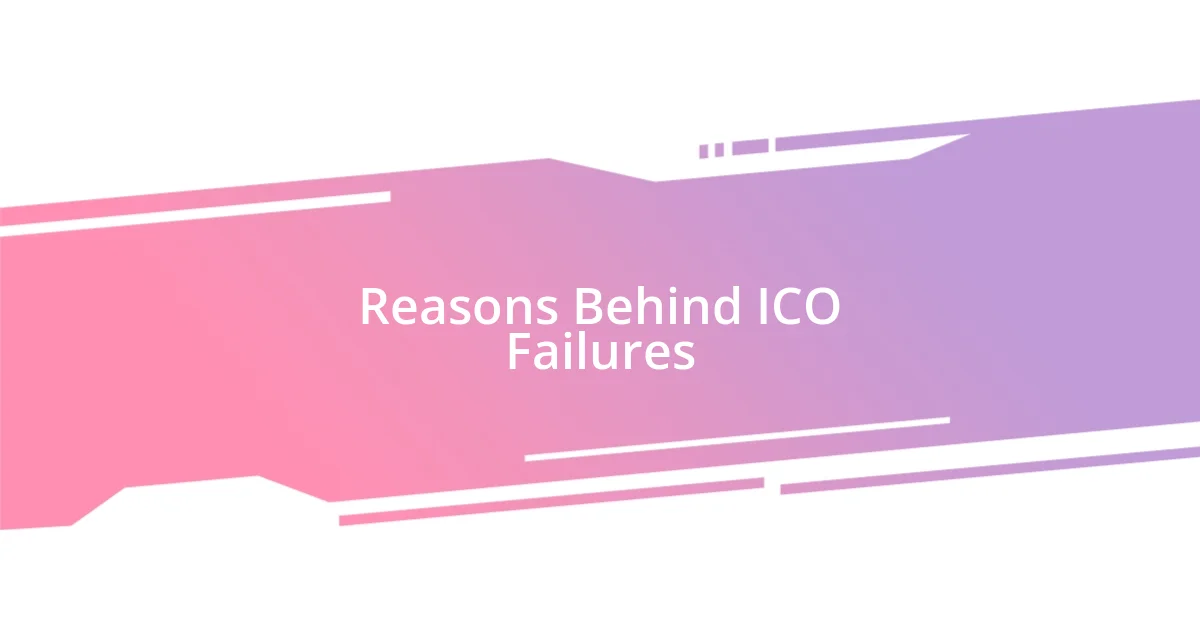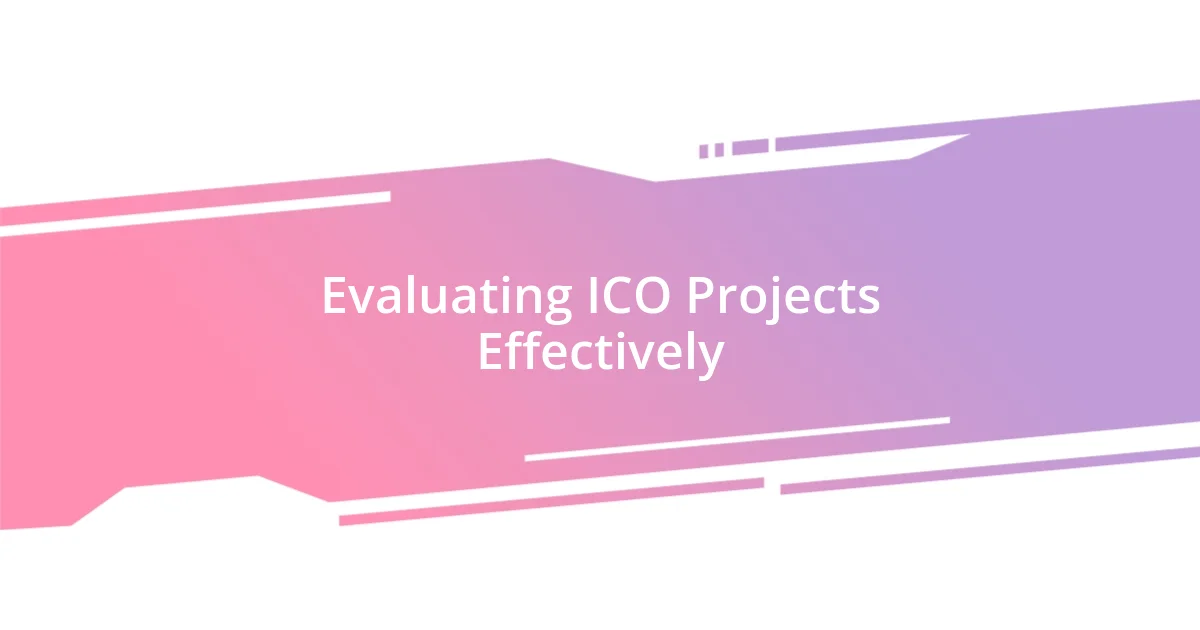Key takeaways:
- Transparency and community engagement are crucial for building investor trust in ICOs, highlighting the need for open communication and a loyal following.
- A solid business model, experienced team, and regulatory compliance are key factors in determining the success or failure of an ICO.
- Thorough market research, clear vision articulation, and a well-defined roadmap are essential strategies for successful ICO planning and execution.

Understanding the ICO Landscape
The ICO landscape is like a vibrant yet chaotic marketplace, where ideas are abundant, but the risks can be surprising. I remember my first foray into this world; I was dazzled by the promises of innovation and high returns. But have you ever wondered how many of those projects truly deliver?
Navigating through countless whitepapers, I often felt overwhelmed. Some projects seemed to communicate their vision clearly, while others left me scratching my head with jargon that felt more like smoke and mirrors than solid plans. Reflecting on those experiences, I realized that clarity and transparency should be my guiding principles when evaluating any ICO.
As I dove deeper, I recognized that market sentiment plays a significant role. The excitement surrounding new tokens can create a buzz that often clouds judgment. It makes me ask, how many investors chase hype rather than substance? I’ve learned the hard way that diving in without a thorough understanding can lead to disappointment.

Reasons Behind ICO Failures
There are a few key reasons behind the failure of ICOs that I’ve seen repeatedly. One major issue is the lack of a solid business model. In many instances, I’ve encountered projects that promised revolutionary technology but failed to outline clearly how they would generate revenue. It’s like building a house without a foundation; without a sustainable plan, the entire project risks collapse.
Another factor that frequently surfaces is the team’s experience and credibility. I recall a particular ICO where the team had grand visions but none of them had any real-world experience in blockchain or finance. It made me question their ability to execute the project. When teams lack the necessary expertise, it’s less likely that they will overcome the inevitable hurdles that arise during implementation.
Finally, regulatory challenges can play a significant role in this failure. I once invested in a project that seemed promising at first, only to have it stumble due to unforeseen regulatory scrutiny. It highlights how important it is to consider legal compliance; half-baked regulatory strategies can lead to devastating repercussions.
| Reason for Failure | Description |
|---|---|
| Weak Business Model | Projects often fail to establish a clear path to revenue generation. |
| Inexperienced Team | Lack of relevant expertise can hinder project execution and growth. |
| Regulatory Challenges | Unaddressed legal issues can lead to project shutdown or penalties. |

Common Mistakes to Avoid
When I reflect on the ICOs that fell short, a few common mistakes really stand out. One time, I invested in an ICO that seemed to promise the moon but had poorly laid out plans. It was frustrating to see how lack of clear communication and direction can mislead investors. If only they had articulated their unique selling proposition more effectively, they might have gained the trust necessary to succeed.
Here are some critical mistakes I believe every investor should be aware of:
- Unclear Vision: If the project’s vision isn’t clearly communicated, it often indicates a lack of focus or direction.
- Ignoring Market Research: Skipping this step can lead to pursuing an idea that has little demand or interest in the market.
- Overpromising Returns: Making unrealistic claims about potential profits can burn bridges with legitimate investors.
- Neglecting Community Engagement: ICOs that fail to build a loyal following can struggle to maintain momentum.
- Disregarding Legal Frameworks: Not factoring in regulatory compliance can quickly render a project obsolete.
I vividly recall a particular ICO where the excitement was palpable, yet they seemed to overlook the community aspect entirely. They launched a flashy website but failed to interact with potential investors, leaving many feeling isolated. It’s a tough lesson that engagement isn’t just a nice-to-have; it’s crucial for building support.

Key Lessons from Failed ICOs
The most striking lesson I’ve learned from failed ICOs is the paramount importance of transparency. I participated in an ICO where the team stopped providing regular updates halfway through the campaign. That lack of communication left me feeling anxious and confused about the project’s progress. It’s a reminder that when teams aren’t open about their developments, it’s easy for investors to feel abandoned and lose trust. Why would anyone invest in a project that seems to be shrouded in secrecy?
Another key takeaway is the critical role of community. I remember an ICO that launched with a big PR blitz but didn’t engage with its backers. The initial excitement fizzled out, and soon investors became disengaged. This experience taught me that building a community isn’t just a bonus; it’s essential for creating loyalty and rallying support. After all, aren’t we more likely to back a project that makes us feel like we’re part of something bigger?
Lastly, I’ve realized that a comprehensive risk assessment can’t be overlooked. I once backed an ICO that seemed promising but ultimately failed because the team ignored potential market challenges. The emotional rollercoaster of waiting for a project’s success is amplified when you haven’t considered what could go wrong. It’s crucial to ask: what are the real-world challenges this project could face? Without addressing this, investors can find themselves unprepared for the harsh realities of the market.

Essential Strategies for Success
When I think about successful ICO strategies, one aspect always comes to mind: thorough market research. I once got involved in an ICO that had a dazzling pitch but forgot to check if there was real demand for the product. It made me question how often do investors consider whether the market truly needs what’s being offered? Discovering and understanding your target audience can make or break a project. Without that insight, you’re basically sailing a ship without a compass, wandering aimlessly.
Another vital strategy is to maintain open lines of communication with your community. I remember following an ICO that sent out regular newsletters. Each update felt like a warm conversation, assuring me that the project was still alive and well. Isn’t it reassuring to feel connected, especially when you’re investing your hard-earned money? This kind of engagement fosters a sense of belonging and trust that can be incredibly powerful in the world of ICOs.
Finally, I can’t stress enough the importance of a well-defined roadmap. In one ICO I participated in, the roadmap was more of a vague outline than a detailed plan. I found myself wondering, what comes next? What are the milestones we should look out for? A solid roadmap not only guides the team but also calms investors’ nerves. It gives everyone a vivid picture of what to expect and helps prevent the anxiety that comes from uncertainty. Trust me, clarity is always a good investment.

Evaluating ICO Projects Effectively
Evaluating ICO projects effectively requires a discerning eye and a willingness to dig deeper than surface-level marketing. I recall reviewing an ICO that dazzled me with glossy visuals and hype, yet as I examined the whitepaper, I felt an unsettling emptiness. Have you ever come across a project that looked promising, only to find its foundations were shaky? A thorough analysis of the whitepaper, from the technology to the use case, is critical in determining if the project has substance or is merely smoke and mirrors.
Moreover, assessing the team behind an ICO is non-negotiable. I once invested based on a charismatic founder who made bold promises. It wasn’t until later that I realized he had a questionable track record. How often do we fall for charm without verifying credentials? Investigating the team’s history and experiences can unveil red flags that might otherwise go unnoticed, helping you avoid potential pitfalls.
Lastly, I believe that evaluating community sentiment is a game changer. I remember joining forums for an ICO where discussions were rife with skepticism about delivery dates and project viability. It’s almost like a gut feeling; if the community is abuzz with doubt, should we really ignore that? Engaging with current investors provides insights into their concerns and can provide invaluable context that statistics alone may not reveal. In my experience, a vibrant but cautious community can often indicate challenges that the project may face down the road.

Building a Resilient ICO Plan
When crafting a resilient ICO plan, I’ve learned that flexibility is essential. In one project I was involved with, team members were so rigid about their original strategy that they failed to adapt to changing market dynamics. Have you ever watched a promising venture crumble because it couldn’t pivot? Flexibility allows you to respond to feedback and market shifts, ensuring your offering remains relevant and appealing.
Another key aspect I’ve discovered is the importance of risk assessment. During an ICO I followed for several months, there was little mention of potential risks, which eventually led to a heartbreaking fallout. At what point should we confront the possible downsides? A strong ICO plan should address risks head-on, outlining contingencies and demonstrating to investors that you’re prepared for hurdles along the way.
Lastly, I believe in the power of continuous learning. One ICO I invested in started strong, but I noticed they dismissed constructive criticism about their approach. How can any project hope to thrive without a willingness to learn and improve? Building a plan that incorporates feedback loops—whether from backers or industry developments—creates an environment where growth isn’t just a goal, but a reality.














